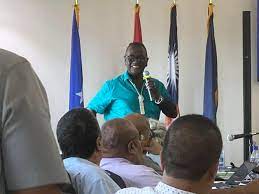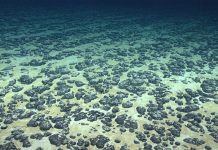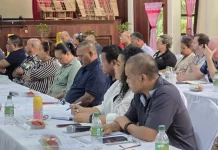Big picture conversations about the future of the Pacific islands should be happening, but they are not, said one of the region’s foremost commentators in an interview published this week in the Marshall Islands Journal.
Breaking down barriers between Pacific islands to spur economic development, visioning 21st century skills that island youth must have for jobs locally or globally, action needed to reverse the non-communicable disease pandemic sweeping the region, and reinventing governance systems for governments to successfully navigate the future of their nations — these are among priority issues that Dr Transform Aqorau believes need to be on the agenda of island leaders but for the most part are not in the conversation.
“There isn’t enough discussion about the future,” said Aqorau, who took up the Solomon Islands National University vice chancellor position in January. Dr Aqorau was in Majuro recently for the official opening of the Parties to the Nauru Agreement or PNA Office. He was the founding CEO of the PNA Office from 2010-2016, guiding it from a decision of the leaders on paper to establish the first office of the PNA to becoming one of the most powerful fisheries organisations in the world.
“This is a conversation that isn’t just for universities,” he said. “Governments need to be discussing their vision for the future and work in tandem with national universities.”
It’s not simply a theoretical exercise. The conversation could have much needed practical impact on islands in the region, he said.
The PNA model has shown the clout of a regional effort and the governance systems that support the vision of the nine islands involved in PNA, he said.
“All Pacific islands need to create opportunities in agriculture, fisheries, tourism and other areas,” he said.
“It’s difficult, but in the region, we should ask ourselves: What kind of collective brand can we create?” He thinks the Pacific could offer itself to visitors as a tourism package, not in competition with one another. “What did we learn from Covid?” he asked. “Those that relied on one thing, such as tourism, struggled.”
“We shouldn’t see ourselves as separate. Instead, we should see ourselves as a single economic bloc (and by doing so) we could help ourselves more (during times like the Covid pandemic).” Tourism and trading blocs would work to the advantage of different islands, combined with technology and educational initiatives.
“In our Blue Continent, we should tear down national barriers and work together,” he said. “If we don’t do these things for the people, respect for governments as institutions will decline. We need to be asking: What is the future we want for our children?”
Pacific youth should have global skills so they are citizens of the world, Dr Aqorau said.
Seeing NCDs undermine the health of people across the Pacific is great concern too Aqorau. “We need to manufacture our own healthy snacks and alternative foods from our own resources,” he said. Governments need to get behind incentivizing production of island “super foods” and phasing out imported junk food to attack the health crisis “so our next generation can live healthy like their forefathers,” he said.
“These are conversations with impact,” said Dr Aqorau. “They create jobs.”
He expressed worry about presence levels of governance in the region. “Current structures of government are not working,” he said. “I don’t see their ability to manage this change unless there is a foundational change in the way governments are designed.”
He said he sees worsening corruption undermining governance in the region. “I see increasing alienation of people and increased power in small groups of elite,” Dr Aqorau said, adding that in the present governance environment there is “no way for youth and women to be involved.”
PNA is a shining example of governance that benefits people in the region, he said. But in the area of resource extraction aside from fisheries — logging and forestry, fossil fuels, mineral mining and deepsea mining — there are no comparable levels of governance. “PNA shows there is a lot that we can do with forestry, deep sea mining and other extraction resources,” he said. “We need governance systems in place so we are not exploited. But it’s happening (exploitation) in forestry.”
In the context of the geopolitical competition that is putting additional stress on governance in the islands, Aqorau offers this suggestion to donors. “Instead of donating things we don’t need that add a level of burden on island countries, support constitutional reforms in governance.”
Dr Aqorau believes that “it won’t always be like this. Young people will demand change.
SOURCE: MARIANAS VARIETY/PACNEWS













